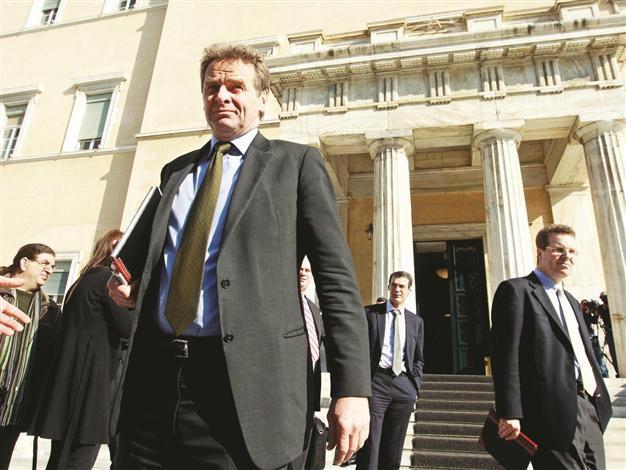Greek PM Papademos at IMF’s door to secure swap agreement
ATHENS- Reuters

The International Monetary Fund’s (IMF) Mission Chief to Greece Poul Thomsen (front) leaves the parliament building after his meeting with former prime minister George Papandreou in Athens Nov 19, 2011. REUTERS photo
Greek Prime Minister Lucas Papademos promised that a debt swap would be clinched in time and dispatched senior officials to Washington yesterday to break a deadlock in talks that has prompted new fears of a disorderly default.Athens needs a deal with the private sector, the EU and the International Monetary Fund (IMF) to avoid going bankrupt when 14.5 billion euros of bond redemptions fall due in late March. Talks with its creditor banks broke down without an agreement on Friday.
A leading representative for the creditors said Athens was not the problem in the talks, suggesting the issue lay with terms insisted on by foreign lenders keeping Greece afloat with aid.
The head of Greece’s debt agency and a senior adviser traveled yesterday to Washington to meet IMF officials, a government source said, and Athens put a brave face on the standoff.
“There is a little pause in these discussions. But I am confident that they will continue and we will reach an agreement that is mutually acceptable in time,” Papademos said according to a transcript of an interview with CNBC.
Under the bailout terms agreed in October, Greek privately-held debt would be reduced by half so that, together with structural reforms, the overall debt to GDP ratio of Greece would fall to 120 percent in 2020 from 160 percent now.
Inspectors from the EU, the IMF and the European Central Bank, due in Athens today for talks on a second, 130-billion-euro bailout, have warned they need the deal with the private sector to achieve that goal before they agree to give more aid.
Papademos said talks on these two processes must be completed over the next two to three weeks. “I think the conditions are in place in order to do so,” he told the broadcaster.
Thinly-veiled criticism of ECB
Charles Dallara, head of the Institute of International Finance (IIF) who represents Greece’s private creditors, told the Financial Times an agreement in principle was needed by the end of this week if it was to be finalized in time for the March bond redemptions.
“All the European heads of state said they wanted a deal with a 50 percent (haircut) and a voluntary agreement,” Dallara was quoted as saying. “Some of their own collaborators are not following that decision.”
Negotiations have stalled over the interest rate Greece will pay on new bonds it offers.
Greece, in its fifth year of recession, has continuously missed its fiscal targets, prompting speculation that it may need further financial support to put its debt on viable footing.
The country has repeatedly flirted with bankruptcy in recent months, with only bailout loans from European partners and the IMF agreed on condition of unpopular austerity measures keeping Greece away from a default.
Uncertainty over fixing Greece’s debt crisis is more of a threat to Europe’s stability than the downgrade on Friday of nine eurozone countries’ credit ratings by Standard & Poor’s, British finance minister George Osborne said yesterday.
The downgrades were largely expected and traders said pressure on Italian and Spanish bond yields yesterday were offset by the ECB stepping in to buy the bonds.
Bill Gross, the manager of the world’s largest bond fund PIMCO, said in a Twitter post that the Standard & Poor’s downgrade had made investors “aware” that countries can default and Greece would be the next example.
















